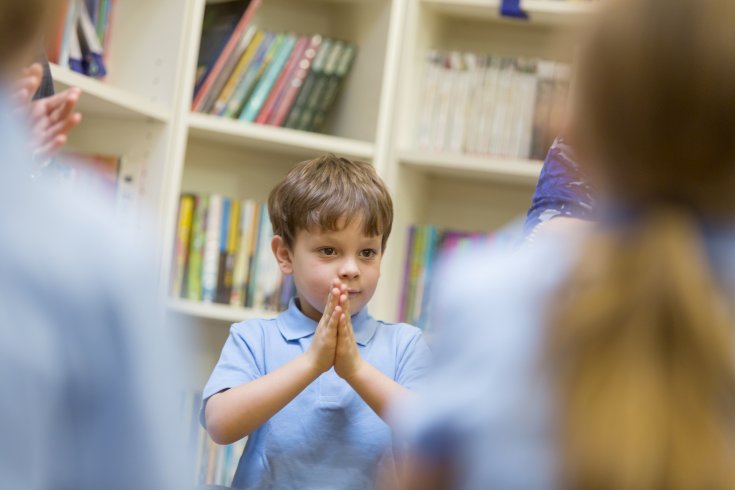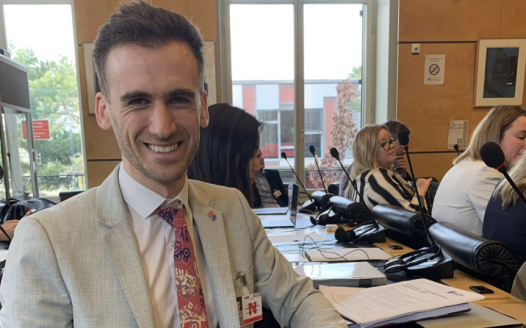Michaela shows the need to end collective worship laws
Posted: Tue, 23rd Jan 2024 by Megan Manson
The Michaela case demonstrates why we need a change in law to enable schools to promote a secular, inclusive ethos, says Megan Manson.
The legal case against Michaela Community School, which decided to restrict how pupils pray, has ignited an explosion of media commentary.
Many are appalled at the situation. After Islamic prayer rituals in the playground led to some Muslim pupils being bullied and coerced for being 'less observant', Michaela's governing body voted 11-1 to break up the gatherings. The school was subsequently sent death threats and bomb scares. Teachers have been under attack in their own homes, and subject to horrendous, racist abuse.
What's perhaps surprising is that many commentators and publications aligned politically right of centre are, in the wake of Michaela, putting out pieces that make a very strong case for secularism.
Gavin Mortimer The Spectator and Fraser Nelson in The Telegraph have both written favourably about France's policy of laïcité – its strict exclusion of religion from public spaces, including state schools. Joanna Williams said in Spiked that Michaela should be "applauded," saying that the "cost of allowing religious, cultural and political division to infiltrate schools is high".
Writing in The Times, Camilla Long even went as far as to argue, "Wouldn't it be better if we banished faith in schools altogether", before calling for Church of England schools to be "rebranded as secular". Perhaps she should join our No More Faith Schools campaign.
As several commentators have pointed out, Michaela is but one of many schools where religious fundamentalists have abused and threatened staff and pupils. St Stephen's Primary School, Parkfield Community School, Batley Grammar School, Kettlethorpe High School, Plashet School and Barclay Primary School are part of a growing list of schools which have been targeted by activists for failing to show Islam the deference they demand.
While it is heartening to see thinkers and commentators from across the political spectrum wake up to the pitfalls of religion in schools and the merits of a secularist ethos, it's unclear how many are truly aware of the scale of the challenge. Michaela is just the tip of the iceberg.
One point that most commentators have missed is that our laws make it technically impossible for a state school to be truly secular.
Because all state funded schools, including the two thirds which have no official religious character, are legally required to hold daily acts of collective worship. These acts of worship must be "wholly or mainly of a Christian character".
The UK is the only western democracy which legally imposes worship on state schools. In contrast, other democracies such as France, the USA and Japan rightly ban staff-led worship in their state schools.
Parents have the right to withdraw their children from collective worship. But this is hardly desirable: it divides the children according to religion or belief, something which schools like Michaela explicitly aim to avoid.
Schools can, in theory, apply to their local authority's Standing Advisory Council for Religious Education to change the character of their collective worship. But in practice, no school to our knowledge has ever succeeded in replacing collective worship with something entirely secular – even if they can demonstrate most of their pupils are from nonreligious families.
The only option open to schools that don't want to hold collective worship is to ignore the law – which is what many in fact do. Michaela is apparently one of those; its head Katharine Birbalsingh has said they don't have prayers, they don't talk about Jesus and they don't hold Nativity plays at Christmas. Ofsted never inspects collective worship provision so these schools are unlikely to get penalised.
But they may be on thin ice. The government is clear that it does not approve of schools opting themselves out of collective worship. In 2021 then-schools minister Nick Gibb suggested the government would "investigate" schools which breached the law on collective worship and would "remind" schools of their duty. A subsequent communication from Baroness Berridge to the National Secular Society confirmed it is "not permissible for a school to apply simply to replace Christian or other religious collective worship with a non-religious assembly".
Where schools do obey the collective worship law, this can be divisive and alienating for parents and their families. In 2015 Burford Primary School, a school without a religious character, joined a Church of England academy trust and subsequently began holding weekly assemblies led by the local church.
When parents challenged the school on this, the headteacher told them "we do not have, and never have had, a 'secular ethos'", claiming this "would imply a lack of connection to religious or spiritual matters, which would not be legal".
Because of the collective worship laws, she's technically correct.
Religious groups prey on this vulnerability – and not just Islamists. The Church of England, in an effort to stop the flood of people leaving its flock, recently outlined plans to step up its use of state education to convert children. These include trying to install evangelists in community schools and taking over the management of nonreligious academies.
Increasing numbers of educational professionals, politicians and human rights groups recognise the inappropriateness of collective worship laws. The UN Committee on the Rights of the Child has repeatedly called for their repeal. Several school leaders publicly spoke out against them in the wake of the 2021 census revealing that England and Wales are no longer majority Christian. Just last week, a peer called for an end to collective worship laws during a House of Lords debate. And 70% of parents are opposed to enforcing this law.
So what's stopping us from repealing this archaic law and allowing schools to assert an inclusive, secular ethos as rigorously as a faith school can promote a religious ethos?
Having an established church is perhaps the biggest reason.
While the Church of England continues to be embedded in the mechanisms of the state, including having 26 seats reserved exclusively for its bishops in the House of Lords, we will see efforts to let schools be more secular frustrated at every turn. When baroness Lorely Burt introduced a bill in 2021 to replace collective worship with inclusive assemblies at nonreligious schools, it was inevitably opposed by the bishops.
Many on the right have long believed that giving the 'toothless' old Church of England a privileged political position somehow acts as a bulwark against more aggressive, fundamentalist religion – especially radical Islam.
But as Michaela has demonstrated, the opposite is true. Our state's deference to the CofE opens the door to more reactionary religion.
It's impossible to predict how the legal case against Michaela will turn out. But chances are, the existence of the collective worship law will not work in Michaela's favour. Michaela could have a hard time convincing a judge that it aims to foster an inclusive, secular ethos, when that's precisely what the law does not permit.
One thing is possible to predict: Michaela will not be the last school to find itself threatened by religious radicals. We urgently need to protect every school which wants to create a safe, inclusive learning environment, free from religious division or imposition. And repealing the collective worship laws should be the first place to start. If that upsets the CofE, so be it. Our schools are here to serve children, not religion.
Media mentions:
- Times Radio (segment begins at 1:19:04)
- Schools Week: Michaela insists it does meet daily worship laws
End compulsory worship
No child should be compelled to pray in school. Join our campaign.








